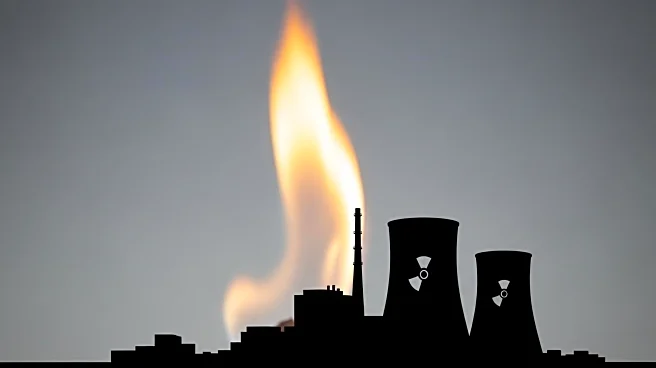What's Happening?
Industry experts have informed a Georgia legislative panel that natural gas and nuclear power are expected to be the primary energy sources in the future. The discussion highlighted the growing demand for electricity driven by data centers, transportation electrification, and heating needs. Josh Browning from Williams Companies emphasized the significant role of natural gas, noting the extensive pipeline infrastructure across the U.S. Scott Tolleson from the Municipal Gas Authority of Georgia pointed out the inefficiency of converting natural gas to electricity, which wastes a substantial portion of its energy. Despite concerns about the finite nature of natural gas reserves, experts assured that the U.S. has at least a century's worth of supply. Scott Hunnewell from the Tennessee Valley Authority (TVA) presented nuclear power as a more land-efficient alternative to renewable sources like solar, which require vast areas to match the energy output of fossil fuels.
Why It's Important?
The emphasis on natural gas and nuclear power as future energy sources has significant implications for U.S. energy policy and economic planning. Natural gas, with its extensive reserves and existing infrastructure, offers a reliable energy source, but its finite nature raises concerns about long-term sustainability. Nuclear power, on the other hand, presents a more efficient land use option, potentially reducing the environmental footprint compared to solar and wind. The focus on these energy sources could influence investment decisions, regulatory policies, and the direction of technological innovation in the energy sector. Stakeholders such as energy companies, environmental groups, and policymakers will need to balance the benefits of these energy sources with environmental and economic considerations.
What's Next?
The legislative panel's discussions may lead to policy recommendations or initiatives to support the development of natural gas and nuclear power infrastructure. Energy companies might increase investments in these areas, while environmental groups could advocate for more sustainable practices. The TVA's stance on prioritizing industrial over data center energy needs may influence future energy allocation decisions. As the demand for electricity continues to rise, particularly from data centers, stakeholders will need to address the challenges of meeting this demand while ensuring energy security and sustainability.
Beyond the Headlines
The reliance on natural gas and nuclear power raises ethical and environmental questions about the long-term impacts of fossil fuel use and nuclear waste management. The potential for fracking to access natural gas reserves could lead to environmental concerns, while nuclear power's waste disposal issues remain unresolved. These factors could influence public opinion and regulatory frameworks, shaping the future landscape of U.S. energy policy.










